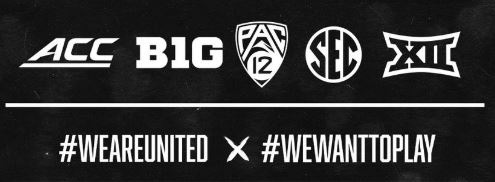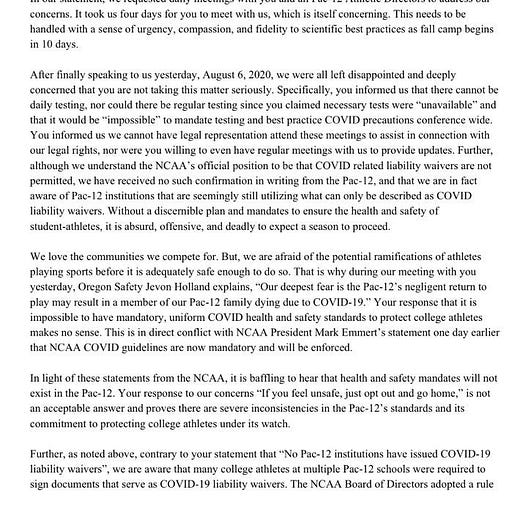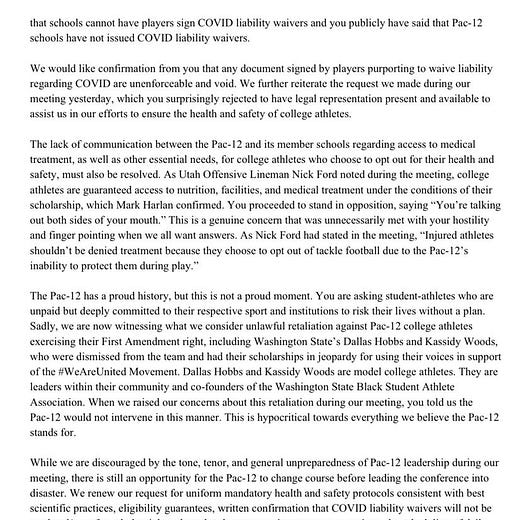The Adults in the Room
College football players are stepping up to do the job that NCAA leaders have repeatedly failed at.

(Image credit: Elisha Guidry)
I don’t think it would surprise anyone here to know that I am personally incredibly supportive of the #WeAreUnited movement that has taken hold of college athletics. I’ve written in the past about how having a college football season in the fall does not make sense in the current landscape, while also hinting at the idea that the NCAA does not have the best interest of student-athletes at heart when discussing the demands of UCLA players back in June. So you can bet I have been watching the past week’s events with growing interest, culminating in this weekend’s flurry of activity.
To quickly recap, everything was moving forward this past week as if business was going to proceed as usual until Saturday morning when the Mid-American Conference announced they were postponing all fall sports until the spring. Suddenly the dominos started to roll; the Power 5 conferences kept leaking out news that they were starting to seriously consider postponing the fall football season, with reports indicating a unified statement could be made sometime this week. Some of the most prominent players in the sport took to Twitter on Sunday to show their support for a potential fall season, only to reveal that they had run an exceptional play fake by revealing they had joined up with the #WeAreUnited movement to create a cohesive message and outline clear demands for a potential season.
All of this is coming off the heels of what was reportedly a disastrous meeting between the members of the Pac-12’s #WeAreUnited group (of which UCLA’s Elisha Guidry is a member of the leadership team) and Pac-12 officials including commissioner Larry Scott. Scott put on another dazzling showcase of incompetence by apparently treating the meeting as nothing more than “a PR stunt” and displaying a clear disconnect with the individual schools that he theoretically represents.
Put all of this together, and we are once again left wondering as to the exact nature of college athletics as a whole.
It is hard to look at the actions of those in charge and not recognize that the driving motivation of those people has been finding ways to keep the gravy train flowing, and it makes sense. Consider, for example, why athletic department officials are bending over backwards trying to find ways to have athletes on campus for a fall football season while universities themselves are doing everything they can to keep students away from campus (as an example, UCLA announced this past week that they were planning on offering only 8% of all courses in person or using a hybrid model, with the vast majority of classes this upcoming semester being online-only). Or consider the proposal on NIL rights that the NCAA presented to Congress which focused more on keeping power within the organization than on giving players any sort of power.
Or just consider that it is August and the NCAA and its member institutions were still attempting to have a fall football season while not having anything close to national health and safety procedures.
If, like me, you are a proponent of increased athlete power, one of the small benefits to the current pandemic has been that the entire concept of “amateurism” has been shown to be the sham it always was. College athletics has become incredibly divorced from the missions of the higher-level institutions they represent. College football, in particular, is a billion-dollar business that single-handedly subsidizes entire athletic departments while still leaving cash to spare. Nebraska coach Scott Frost said the quiet part out loud on Monday when he stated that Nebraska would lose $80-120 million if they did not play a football season. The schools, conferences, NCAA, sports media; everyone has gotten fat on the cash cow that is college football.
Well, not everyone I guess.
One of my big takeaways from the Pac-12 Unity Group’s list of demands was that everything had a, for lack of a better word, unifying theme. At the core of the demands is the idea that football players sacrifice their bodies to make their schools boatloads of money yet are stripped of any power as soon as they sign their letters of intent. And even the biggest opponent of the athlete-led movements can grudgingly agree that there are some common-sense changes in that list that could help the long-term health of the sport. Even the new combination with the #WeWantToPlay group acknowledges that everyone involved wants to play football as soon as possible, but that it should be done in a safe manner. The players are beginning to recognize that they have agency due to being the engine that makes college football run, and are increasingly willing to flex that muscle.
But again, the question becomes whether the players would need to speak up if the people in charge had put aside their own financial self-interest and taken the necessary steps to ensure player safety and player equity. Clearly no one in power was raised by my mom, as one of her favorite sayings is “don’t put off the hard work until the last minute.” The NCAA has had since March to come up with a coherent plan; instead, they put their hands up and said it was up to the conferences, because what is a global pandemic if not another opportunity to show how useless the NCAA actually is. The individual conferences had since March to come up with a coherent plan; instead, we’ve seen half-measures meant to give an appearance of trying while failing to address the bigger concerns.
Even the sudden realization that a football season needs to be postponed does not come from a place of altruism. It’s coming because university presidents are starting to pay attention, and they’ve realized that college football has no plan if a player should die, let alone if hundreds get sick, or if hundreds experience long-term health effects should they catch the virus. University presidents don’t like not having a plan, and they especially don’t like having a plan that does not protect them from millions of dollars in liability lawsuits.
There is this nagging thought in my head that we would not be in this current situation if the people professing to be the adults had actually done the right thing. If the adults had taken the pandemic seriously; if they had acted early and tried to create meaningful protocols and systems nationwide that could allow a college football season to occur in the fall. If these adults had put the sports’ well-being over their quest for profits and power. If at any point in the past some-odd years the adults would actually act like adults instead of throwing hissy fits in private.
What we’ve learned from this pandemic is that there were never any adults in the room to begin with.
But it appears some adults have finally arrived, and the whole landscape of college athletics is going to change because of it.







As you suggest, even if all the executives cared about was there bottom line, they should have made a plan to ensure safety so that the players wouldn't unite and therefore also use the opportunity to raise other serious concerns that could lead to a crumbling of their unfair model.
Well written. A complete failure by those paid the big $$ - Larry Scott, AD’s, and coaches to develop a comprehensive plan protecting players (“student athletes” as we’re repeatedly told) There should have been multiple contingencies in place. Maybe season still would have been postponed but at least they would’ve tried